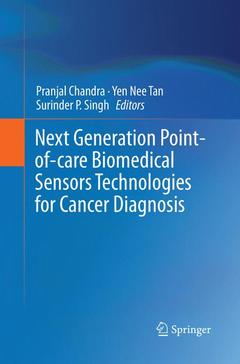Description
Next Generation Point-of-care Biomedical Sensors Technologies for Cancer Diagnosis, 1st ed. 2017
Coordinators: Chandra Pranjal, Tan Yen Nee, Singh Surinder P.
Language: English
Subjects for Next Generation Point-of-care Biomedical Sensors...:
Publication date: 12-2018
Support: Print on demand
Publication date: 01-2018
Support: Print on demand
Description
/li>Contents
/li>Biography
/li>Comment
/li>
This book presents recent research on cancer detection methods based on nanobiosensors, which offer ultrasensitive point-of-care diagnosis.
Several methods for diagnosing cancer have been discovered and many more are currently being developed. Conventional clinical approaches to detecting cancers are based on a biopsy followed by histopathology, or on the use of biomarkers (protein levels or nucleic acid content). Biopsy is the most widely used technique; however, it is an invasive technique and is not always applicable. Furthermore, biomarker-based detection cannot be relied on when the biomarkers are present in an extremely low concentration in the body fluids and in malignant tissues.
Thus, in recent years highly sensitive and robust new cancer diagnosis techniques have been developed for clinical application, and may offer an alternative strategy for cancer diagnosis. As such, this book gathers the latest point-of-care cancer diagnostic methods and protocols based on biomedical sensors, microfluidics, and integrated systems engineering. It also discusses recent developments and diagnostics tests that can be conducted outside the laboratory in remote areas. These technologies include electrochemical sensors, paper-based microfluidics, and other kit-based diagnostic methods that can be adapted to bring cancer detection and diagnostics to more remote settings around the globe.
Overall, the book provides students, researchers, and clinicians alike a comprehensive overview of interdisciplinary approaches to cancer diagnosis.
Dr. Pranjal Chandra is currently employed as Assistant Professor and principal investigator at Department of Biosciences and Bioengineering, Indian Institute of Technology Guwahati, Assam, India. He earned his Ph.D. from Pusan National University, South Korea and did post-doctoral training at Technion-Israel Institute of Technology, Israel. He has published over 50 research articles in reputed journals and 1 book (IET, London). He is also a visiting scientist at IBST, South Korea. Pranjal's research contributions are highly interdisciplinary, spanning a wide range in nanobiotechnology, nanobiosensors, lab-on-chip systems for biomedical diagnostics, and nanomedicine. His work has been highlighted in the World news of Royal Society of Chemistry, Cambridge as "A new system for cancer detection” and also featured as a key scientific article in the Global Medical Discovery news Canada. He is recipient of many prestigious awards and fellowships such as; Ramanujan fellowship (Government of India), BK -21 and NRF fellowship of South Korea, Technion post-doctoral fellowship, Israel, University of Montreal Post-doc fellowship, Canada, NMS Young scientist Award (2016) etc. He is also editorial board member of a dozen international journals including; World journal of methodology, USA; Frontiers of Biosciences, USA; Journal of Biosensors and Bioelectronics, USA etc.
Dr. Yen Nee Tan is the Principle Investigator and Program Manager of the Biomimetic and Biomedical Materials at the Institute of Materials Research and Engineering, under the Agency of Science, Technology and Research (A*STAR), Singapore. She is also the Adjunct Assistant Professor of Chemistry at the National University of Singapore. Her research focuses on the design of biogenic smart materials inspired by Nature and development of ultrasensitive technologies for biomedical diagnostics, food sensing and environmental monitoring. She holds 10 patents and 2 licenses on nanobiosensors.




